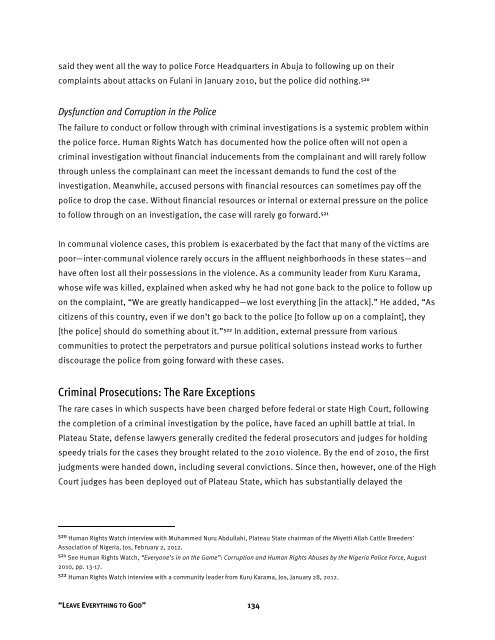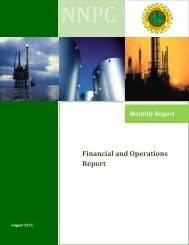Create successful ePaper yourself
Turn your PDF publications into a flip-book with our unique Google optimized e-Paper software.
said they went all the way to police Force Headquarters in Abuja to following up on their<br />
complaints about attacks on Fulani in January 2010, but the police did nothing. 520<br />
Dysfunction and Corruption in the Police<br />
The failure to conduct or follow through with criminal investigations is a systemic problem within<br />
the police force. Human Rights Watch has documented how the police often will not open a<br />
criminal investigation without financial inducements from the complainant and will rarely follow<br />
through unless the complainant can meet the incessant demands to fund the cost of the<br />
investigation. Meanwhile, accused persons with financial resources can sometimes pay off the<br />
police to drop the case. Without financial resources or internal or external pressure on the police<br />
to follow through on an investigation, the case will rarely go forward. 521<br />
In communal violence cases, this problem is exacerbated by the fact that many of the victims are<br />
poor—inter-communal violence rarely occurs in the affluent neighborhoods in these states—and<br />
have often lost all their possessions in the violence. As a community leader from Kuru Karama,<br />
whose wife was killed, explained when asked why he had not gone back to the police to follow up<br />
on the complaint, “We are greatly handicapped—we lost everything [in the attack].” He added, “As<br />
citizens of this country, even if we don’t go back to the police [to follow up on a complaint], they<br />
[the police] should do something about it.” 522 In addition, external pressure from various<br />
communities to protect the perpetrators and pursue political solutions instead works to further<br />
discourage the police from going forward with these cases.<br />
Criminal Prosecutions: The Rare Exceptions<br />
The rare cases in which suspects have been charged before federal or state High Court, following<br />
the completion of a criminal investigation by the police, have faced an uphill battle at trial. In<br />
Plateau State, defense lawyers generally credited the federal prosecutors and judges for holding<br />
speedy trials for the cases they brought related to the 2010 violence. By the end of 2010, the first<br />
judgments were handed down, including several convictions. Since then, however, one of the High<br />
Court judges has been deployed out of Plateau State, which has substantially delayed the<br />
520 Human Rights Watch interview with Muhammed Nuru Abdullahi, Plateau State chairman of the Miyetti Allah Cattle Breeders’<br />
Association of Nigeria, Jos, February 2, 2012.<br />
521 See Human Rights Watch, “Everyone’s in on the Game”: Corruption and Human Rights Abuses by the Nigeria Police Force, August<br />
2010, pp. 13-17.<br />
522 Human Rights Watch interview with a community leader from Kuru Karama, Jos, January 28, 2012.<br />
“LEAVE EVERYTHING TO GOD” 134




